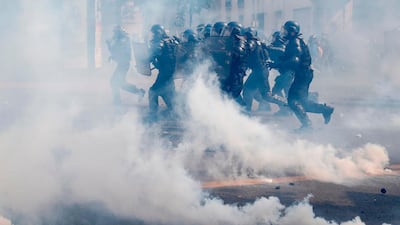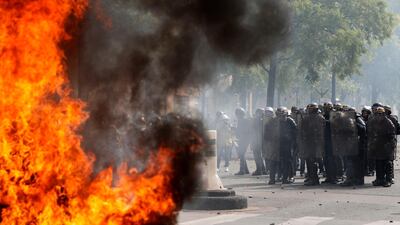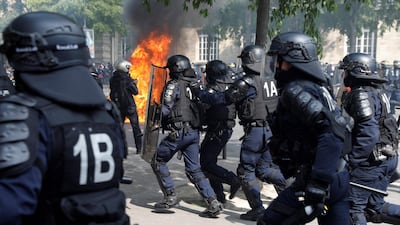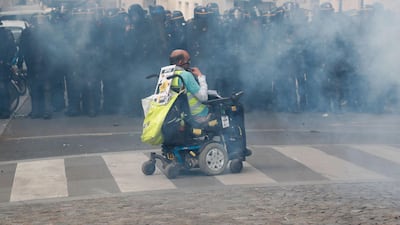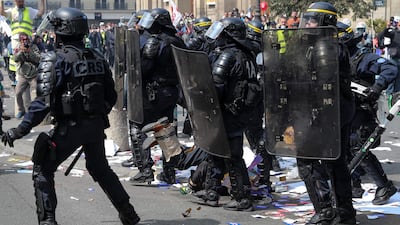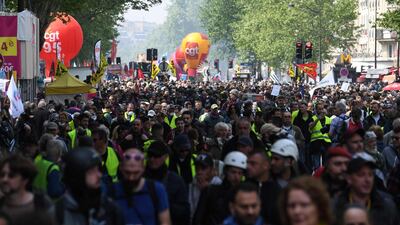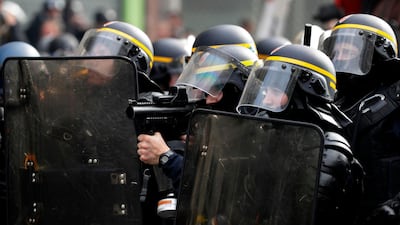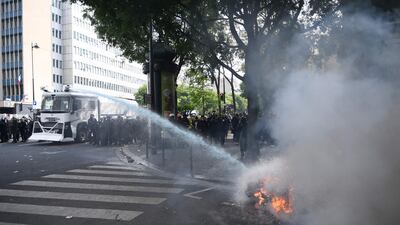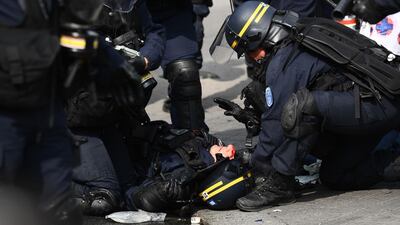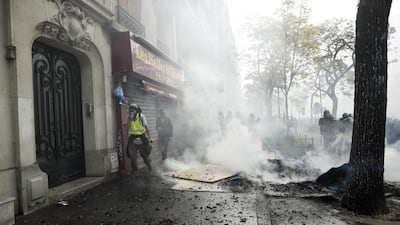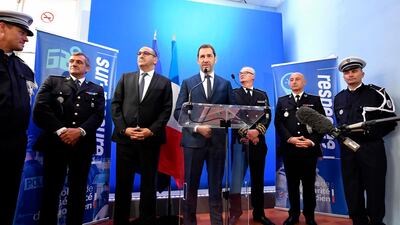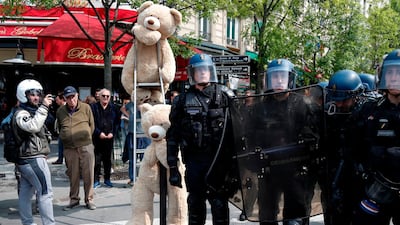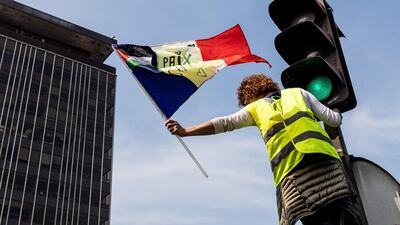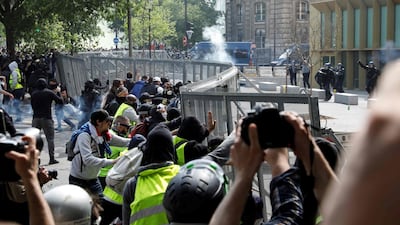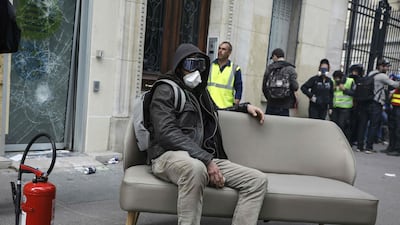French police have played a crucial but controversial role in six months of yellow-vest protests, drawing official acclaim but also a rising level of condemnation for alleged brutality.
The president Emmanuel Macron has warmly praised officers – out again in force in Paris and provincial cities and towns as Saturday's 25th weekly protest took place – for working with courage and dedication in the face of relentless attack. He has even promised a special bonus.
But as demonstrations take their toll on morale, police and gendarmes – technically a branch of the armed services – have also been reviled by protesters as violent tools of an unyielding state.
Resources have been stretched to the limit in the struggle to control demonstrations that have sometimes degenerated into riots. Roughly 7,400 officers were on the streets of Paris for last Wednesday’s May Day protests.
Government figures suggested about 160,000 protesters took part in demonstrations around the country, 16,000 of them in the capital. A trade union claimed the true figure nationally was nearly twice as high but, at either end of the range, the demands on police are significant.
Officers complain of being overworked and demoralised to the extent of contemplating suicide.
Some succumb to the strains. In the four months since January, 33 police officers and gendarmes have taken their own lives. The total for the whole of last year was 68.
Motives differ from case to case, but many officers cite dealing with the yellow vest – or Gilets Jaunes – protests as a source of enormous stress.
Last month, at one of the protests that have blighted central Paris since the movement began last November, police were taunted with chants of “suicidez-vous” – kill yourselves – in a sign of the increasing ugliness of the confrontations.
Footage has surfaced of three separate instances of apparent police misconduct on May Day: a riot officer throwing a lump of paving back at protesters, a policeman repeatedly striking a demonstrator on the face and another thrusting his baton into a man’s trousers.
All are under investigation but claims and counter-claims have become a routine feature of the unrest.
When Gilet Jaunes and so-called “Black Bloc” anti-capitalist agitators were accused of trying to force their way into a Paris hospital’s intensive care unit during Wednesday’s protests, supporters insisted they were trying to escape a police charge and teargassing.
Christophe Castaner, the interior minister, is under pressure to resign after using the word "attack" to characterise the protesters' actions. He has since withdrawn the description but it remains to be seen whether the support pledged by Mr Macron's prime minister, Edouard Philippe, will be maintained.
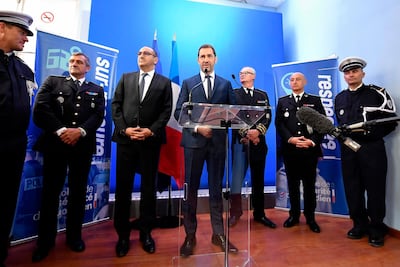
Faced with what a commission of inquiry from the Senate, the upper house of France’s parliament, called a deep malaise among police, Mr Castaner, whose role in charge of security brings the nickname ‘France’s No 1 flic [cop]’, announced in April the formation of a dedicated team to prevent suicides.
He said its members would be on hand 24 hours a day to offer “an attentive ear” and help to any officer needing it.
France’s contentious 35-hour work week – which some support but others say is burdensome on businesses – has little practical meaning for the police’. Officers cannot refuse if events require them to be on duty and the demands on their services can make it impossible to take time off to compensate. Even getting paid for overtime is an issue.
Mr Castaner has admitted that the state owes €275 million (DH1.13bn) in police overtime going back “not recent months or even years but for decades”.
The impacts of the terrorist threat, as well as the mass demonstrations common in France, are among the causes and a parliamentary report put the figure for 2017 alone at €22m.
Mr Castaner said: “This is something I want to address but I cannot say that with the snap of my finger, I will find €275m.”
The offer of a bonus for police involved in the protests was made by Mr Macron last December after violent rioting around the renowned Parisian avenue, the Champs-Elysees. He gave no further details.
An investigation by the newspaper Liberation listed as factors contributing to the wave of suicides access to weapons, overwork and fatigue, a “law of silence” to deter complaints, low income and a “dehumanisation of the profession” that leads to officers feeling marginalised. Having to work “in proximity to death”, the effect of staggered duty rosters and pressure from superiors are also seen as fuelling disenchantment.
One officer quoted in the Senate report said he asked in vain for his “overwhelming” workload to be reduced. “I became ill,” he said. “I began to be reprimanded and sent on training courses during leave periods.”
Others lament the way social upheaval has turned them “from national heroes to enemies”, far distant from the image of one officer crying on another’s shoulder after terrorist attacks killed 130 people in Paris in November 2015.
The supposedly non-lethal “flash balls” – rubber bullets fired in response to violence – have allegedly led to one death and several serious injuries among Gilets Jaunes. Others have been badly hurt in police charges, though officers are routinely subjected to severe provocation.
Liberation quoted a member of the Compagnies Republicaines de Securite – a general reserve of the national police commonly involved in riot and crowd control – called “Frederic” (the name was changed) as saying: “When I tell people I belong to the CRS, many see me only as a guy who will batter protesters.”
